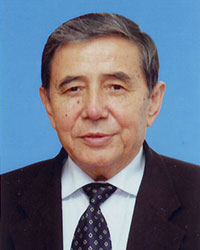SHARE WITH FRIENDS:
 People's Writer of Uzbekistan Utkir Hoshimov was born on August 1941, 5 in the Dombirabad district of Tashkent. His childhood was spent during the hardships and needs of the war. As a result, he was forced to study while working on his family's circumstances, even though he graduated from high school with honors. While studying at the correspondence department of the journalism faculty of Tashkent State University, he worked in such newspapers as "Temiryolchi", "Tashkent Haqiqati", "Kizil Uzbekistan".
People's Writer of Uzbekistan Utkir Hoshimov was born on August 1941, 5 in the Dombirabad district of Tashkent. His childhood was spent during the hardships and needs of the war. As a result, he was forced to study while working on his family's circumstances, even though he graduated from high school with honors. While studying at the correspondence department of the journalism faculty of Tashkent State University, he worked in such newspapers as "Temiryolchi", "Tashkent Haqiqati", "Kizil Uzbekistan".
In 1966-1982 he was the head of the department of the newspaper "Tashkent evening", in 1982-1985 G. He has been working as a deputy editor-in-chief at the Gulom publishing house, and since 1985 as the editor-in-chief of the Sharq Yulduzi magazine. He also served as a deputy of the Oliy Majlis of the Republic of Uzbekistan and chairman of the Committee on Press and Information.
Utkir Hoshimov's work began with journalism, and his first book was published in 1962 under the title "Steel Rider". His first story was published in 1963 under the title The Four Letters. Later, on the basis of this story, the story "Desert Air" (1963) was created. A letter from teacher Abdullah Qahhor about this story inspired and encouraged the young writer. After that, his stories "What do people say", "The wind blows" appeared. In particular, the author's short stories "Spring does not return" (1970), "Listen to your heart" (1973) brought fame to the writer. In 1976, the author of these works was awarded the Republican Youth Prize.
In his novel "There is light, there is shadow" (1976), the author raises important moral and ethical issues of the time, revealing the flaws in the social life of society, the essence of stagnation. After that, he continued the debate on spirituality by creating another beautiful work - the story "World Affairs" (1982), which was awarded the Oybek Prize of the Writers' Union of Uzbekistan.
The novel "Between Two Doors" has a special significance in the work of Utkir Hoshimov. In it, the writer skillfully summarizes the historical destiny of his people, covering a period of almost forty years and on the example of a number of confusing and complex destinies. Due to this, O. Hoshimov's novel won the Hamza Republican State Prize in 1986.
Utkir Hoshimov also worked in the story genre. In particular, his works "Love", "A Farmer's Day", "The Last Victim of the War", "The Uzbek Case" made a significant contribution to the development of Uzbek storytelling. His articles such as "The White Notebook of the Heart", "Those who violated the sacred oath", "What do we say to the generations", "Where is the logic?", "State secret" have become one of the achievements of Uzbek journalism in recent years.
Utkir Hoshimov influenced the development of modern literature not only as a talented storyteller, short story writer, novelist and publicist, but also as a playwright. His dramas and comedies "Spring of Hazon", "Happy Weddings", "Medicine of Conscience", "Human Loyalty", "Repression" have a worthy place on the stage of the Republican theaters. The book "Letters in the margins of the notebook" (2001) has left a certain mark on the socio-spiritual life.
Utkir Hoshimov as a translator Berggolts, S. Tsveyg, Mustay Karim, V. Shukshin translated his works into Uzbek. His best and best works have been translated into Russian and other languages. The total number of published works of the author is more than fifty, and their total circulation exceeds about two million. O' In 1991, Hoshimov was awarded the honorary title of "People's Writer of Uzbekistan" for his fruitful creative work. He was awarded the Order of Labor Glory (1996) and the Order of Merit (2001). He died on May 2013, 24 in the city of Tashkent.